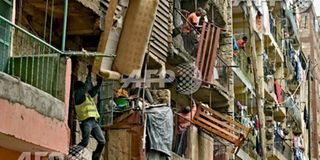Kenya demolishes 78 risky buildings after deadly collapse

Residents move sofas and beds from a block of flats which is going which is going to be demolished on May 6, 2016. AFP photo
A week after an apartment block collapsed killing 42 people, Nairobi authorities on Friday began to demolish 78 high risk buildings, according to an AFP journalist at the scene, leaving some residents homeless.
As excavators moved in to demolish the unsafe dwellings, officials came under fire for not giving residents of the buildings earmarked for demolition adequate warning.
People who had been living in the buildings began the search for new shelter carrying their furniture and possessions through the nearby streets.
The demolitions came a day after four people were pulled alive from the rubble of the building that collapsed last Friday when heavy rains hit the Kenyan capital causing floods and landslides, although one died shortly after being rescued.
"They are risky, people cannot stay there. We don't want to suffer another incident where a building comes down with residents," said Christopher Khaemba, the head of Nairobi county planning.
He spoke to journalists in the impoverished Huruma area in the north east of the capital -- the same part of the city as the six-floor building that collapsed last week due to shoddy construction.
As many as 70 people are still missing following the tragedy and police have arrested and bailed the two brothers who owned the building.
The authorities have faced calls to prevent a repeat of the collapse, but there was also criticism of them for not giving residents enough notice.
"They could have at least given the families a one month notice before demolishing," said Grace, a resident of one of the blocks that will be levelled by officials.
"People do not know where to take their families."
Some evicted residents alleged that thieves had taken advantage of the chaos to steal from them while others complained about being forced to leave days after paying the rent for the month of May.
Several buildings have collapsed in recent years in Nairobi and other Kenyan cities, where a property boom has seen buildings shoot up at speed, often with scant regard for regulations.




